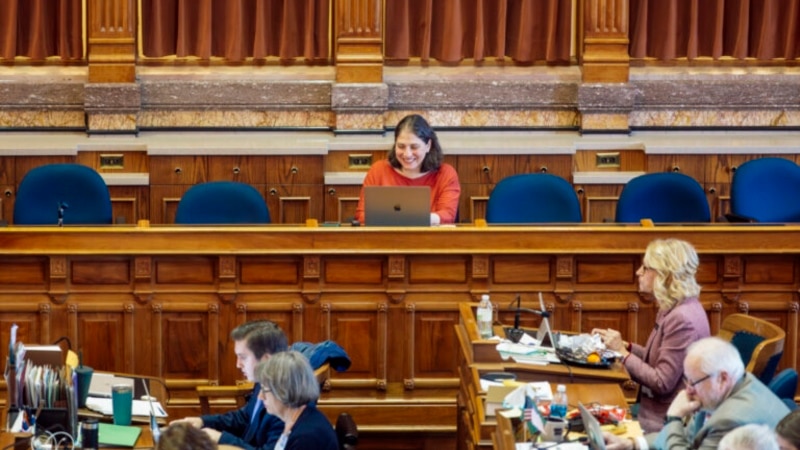
An Iowa journalist who was denied press credentials for five years has finally been granted access to the state House of Representatives after filing a lawsuit.
Laura Belin runs “Bleeding Heartland,” a self-described community blog focused on Iowa politics. She is also the statehouse reporter for KHOI community radio station in Ames, Iowa.
For the past five years, Belin has had to cover legislative proceedings from the public gallery or via online streaming after her repeated applications for credentials were denied.
“I think it was based on the content I publish and my viewpoint,” Belin said. “I have been very critical of the Republican leadership in the Iowa legislature and the executive branch. And the Republican legislators were very aware of my work.”
Belin first applied for press credentials to cover the Iowa House in 2019. The request was denied. Applications made every year since ended in denial too. Belin says the house clerk told her that independent journalists cannot receive credentials.
Then, Belin said, the policy changed. Journalists now had to work for a recognized news organization with a certain size audience and finally, she says, the clerk stopped responding to her applications and appeals.
So in January, Belin filed a federal lawsuit.
The lawsuit accuses Meghan Nelson, the chief clerk of the Iowa House of Representatives, of four counts of violating Belin’s First Amendment rights, namely, freedom of the press and free speech.
In the lawsuit, Belin says her online news site received between 88,000 and 119,000 monthly views in the 2023 legislative session.
Four days after filing the lawsuit with the U.S. District Court, Belin was issued a press credential.
The Iowa clerk, Nelson, declined VOA’s request via phone for comment. But she did provide a copy of the press credentialing policy.
Press credentials allow journalists to report from the floor of the Iowa House of Representatives. The “press bench” has dedicated workspaces for reporters, allows the video and audiotaping of proceedings, and immediate access to legislators.
Accreditation also allows journalists to attend briefings by the speaker of the Iowa House of Representatives, Pat Grassley.
“People need to be aware of what’s happening in the state legislatures,” said Belin. “It is so important. I know a lot of the news coverage is focused on national news, but in many ways the state legislatures affect people’s lives even more than what happens in Congress.”
Belin started covering the Iowa legislature and politics in 2007. And she has a long career in journalism.
In the 1990s she covered Russian politics for the Open Media Research Institute, based in Prague. She also reported for VOA sister network Radio Free Europe/Radio Liberty in the late 90s through mid-2000s.
Belin is also an expert in authoritarian governments and has a doctorate in Russian studies from the University of Oxford.
The Institute for Free Speech, a non-profit devoted to protecting First Amendment rights, advocated for Belin by writing a memo. It now represents Belin by filing the lawsuit against the Iowa House’s clerk.
“Journalistic access and a free press are fundamental to a functional democracy,” said Tom Garrett, chief communication officer for the institute. “The ability for legitimate journalists like Laura, who has nearly three decades of experience, to have access, is tied to things like the public having full and accurate information and to hold politicians and lawmakers accountable.”
Denial of access can have a chilling effect on the press and violate the First Amendment, say media experts.
The U.S. Press Freedom Tracker details almost 90 cases of reporters being denied access since the coalition of media rights groups started documenting cases in 2017. Governors, the White House, cities, towns and even school boards have denied journalists access, says the Tracker and other watchdogs.
“This isn’t just happening in Iowa,” said Kirstin McCudden, managing editor of the U.S. Press Freedom Tracker. “Every time a journalist is hindered and denied access to our elected officials, it affects all of us. We are all members of the public first and we trust journalists to be one way that we get information.”
Belin’s five-year fight for credentials is not fully resolved. She now has a credential, but it could be revoked.
Her lawyer, Courtney Corbello, Institute for Free Speech attorney, says their lawsuit asks for the press credential policy to be rewritten and for a restraining order to prevent Laura’s credential from being taken. Currently, their lawsuit contends, the credential policy is vague and discriminatory.
“Journalists play a very substantial and significant role in society,” Corbello said. “To deny some of them access, so that only those that report in the way the government prefers is fundamentally contrary to what our society should be.”
The parties are currently in settlement talks.
